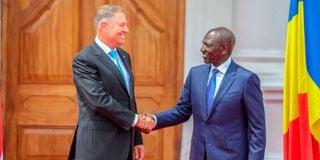Kenya, Romania sign deals on climate and agriculture

President William Ruto with Romania's President Klaus Iohannis at State House, Nairobi, on November 14, 2023.
Kenya has signed four agreements with Romania that will see the two countries cooperate on environment and climate change, sanitation, veterinary and food security as well as agricultural research and cooperation.
The two countries will also promote ties between the Romanian Diplomatic Institute and the Kenya Foreign Service Academy.
Speaking during the joint press briefing with his Romanian counterpart Klaus Iohannis at State House Nairobi, President William Ruto revealed that he will be addressing the European Union parliament next week on the viable ways in which Africa and Europe can work together for mutual benefit.
The agreements signed, President Ruto said, will boost Nairobi’s bilateral relations with Bucharest, which began in 1968, and will not only increase trade and investment between the two nations, but also enhance their efforts to protect the environment and combat climate change.
“We will see improved terms of trade between us and Romania, and we will take advantage of the expansive space created by the private sector. These agreements will extend their benefits to the East African and African market at large as we now consolidate our markets,” said the President.
The Head of State urged President Iohannis to join him in advocating for climate action and called on developing countries to work with African leaders to support the Nairobi Leaders’ Declaration adopted at the Africa Climate Summit in Nairobi. The declaration positions Africa as a continent with renewable resources, mineral wealth and human capital, and as a critical player in the future of humanity.
The host also briefed the visiting president on Kenya’s active role in addressing instability in Somalia, the Democratic Republic of Congo and Sudan.
“We also recognise that this is happening elsewhere in the world, in Russia-Ukraine, Israel and Gaza, and that we must come together to resolve these conflicts so that we have a much more peaceful and stable globe in which we can all pursue our aspirations as nations,” he said.
The two leaders also discussed their commitment to working towards the achievement of the global development agenda, including the Sustainable Development Goals, and how the two nations can work together in the digital and technology space, drawing on Bucharest’s knowledge and skills.
“Whether it is delivery of government services, whether it is revenue, health or agriculture, technology is becoming a great enabler and we can share experiences, expertise and knowledge in this space,” said President Ruto.
He added that Kenya has a lot to learn from Romania on culture, especially theatre, which is well developed in the European country.
President Iohannis said his visit to Kenya was timely, coming barely a few months after his country launched the Romania-Africa partnership. He revealed that Kenya, being a major gateway for trade in Africa, was “naturally” his first stop.
“Today’s discussion was based on strengthening our relationship and opening up new areas of cooperation. Kenya is an icon of democracy and political stability, as well as a transport and development hub in Africa, and it is very important for us to have many areas of cooperation,” said President Iohannis.
He also urged Romanian companies to invest in Kenya and help achieve the desired results of agreements signed between the two states.
“The war between Russia and Ukraine has had a direct impact on our security and I would like to say that Romania is interested in resolving conflicts through dialogue and compliance with international humanitarian law,” President Iohannis said.
The war between Russia and Ukraine has destabilised the supply of grain, mainly from Ukraine, to several parts of the world, posing a threat to food security.
“Romania has facilitated the movement of grain from Ukraine to the world’s main markets. This is in line with our desire to ensure food security in countries that depend on such imports,” he said.





